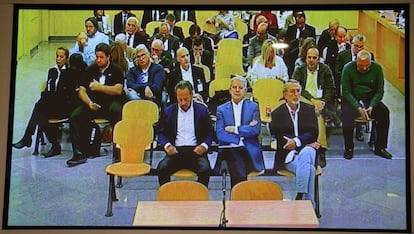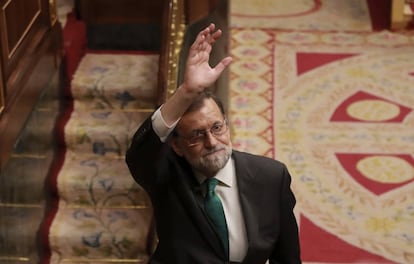Spain’s Supreme Court confirms convictions in Gürtel graft case
Justices ratified criminal penalties against 29 individuals and upheld the civil liability of the Popular Party

The Spanish Supreme Court on Wednesday confirmed 29 convictions handed down in 2018 against leading members of Gürtel, a corrupt bribes-for-contracts network that operated across six Spanish regions between 1999 and 2005.
Justices have also backed the national High Court (Audiencia Nacional)'s decision declaring the Popular Party (PP) civilly liable in connection with the case, and telling it to return €245,000 obtained through unlawful channels.
But the Supreme Court has also found that the Audiencia Nacional’s wording was “excessive” when it repeatedly mentioned the PP’s “caja B,” a reference to a parallel accounting system allegedly maintained by the conservative party for years.

The Supreme Court notes that the existence of such parallel accounting was not on trial in 2018, and that the Audiencia Nacional’s use of the term made it seem like a proven fact. The PP had appealed the 2018 decision, arguing that it associated the party with a crime that it had not formally been accused of.
The May 2018 ruling triggered a political earthquake in Spain and ended the political career of then-Prime Minister Mariano Rajoy of the PP. Pedro Sánchez of the Socialist Party (PSOE) led a successful no-confidence motion with support from Unidas Podemos and various small regional parties, and was sworn into office on June 2 of that year.
With nearly 200 official suspects, Gürtel became the largest pre-trial probe in modern Spanish history and was broken up into sections to facilitate the investigation.
Rajoy himself was called in as a witness on July 26, 2017. During questioning, he said the PP never accepted cash donations from businesses and insisted that he personally never dealt with the party’s financial affairs, only the political ones. In its 2018 ruling, the Audiencia Nacional questioned the “credibility” of Rajoy’s statements.
Revised convictions
The Supreme Court has slightly reduced the prison term for Luis Bárcenas, a former PP treasurer who has been a key element of the Gürtel investigation. Instead of 33 years and four months, he will serve 29 years and one month. In July 2013, Bárcenas admitted to being the author of secret hand-written ledgers — first published by EL PAÍS in January of that year — that suggested the existence of illegal corporate donations to the PP and cash payments to top PP officials. He was also found to have a fortune hidden away in foreign bank accounts.
The court has not altered the 51-year prison term against the mastermind of the corrupt business network, Francisco Correa (whose surname translates as belt, or Gürtel in German). Correa was a businessman who cultivated relationships with PP officials, offering them gifts in exchange for government contracts in public works and event organization. At the height of his power, Correa went by the nickname of Don Vito, after the character in The Godfather.
The Supreme Court also confirmed the civil liability of former PP minister Ana Mato, who was found to have accepted gifts from the Gürtel network valued at €25,608.
In its decision, the Supreme Court agrees with the Audiencia Nacional that companies controlled by Correa worked together with PP leaders and party members to create a “stable collaboration.” Under the system, Correa’s businesses received preferential treatment in tenders for public contracts, and government officials received cash and gifts in exchange. Correa companies organized trips, events and party conventions for the PP, in a system that used false invoicing and front companies to conceal the origin of the funds.
English version by Susana Urra.
Tu suscripción se está usando en otro dispositivo
¿Quieres añadir otro usuario a tu suscripción?
Si continúas leyendo en este dispositivo, no se podrá leer en el otro.
FlechaTu suscripción se está usando en otro dispositivo y solo puedes acceder a EL PAÍS desde un dispositivo a la vez.
Si quieres compartir tu cuenta, cambia tu suscripción a la modalidad Premium, así podrás añadir otro usuario. Cada uno accederá con su propia cuenta de email, lo que os permitirá personalizar vuestra experiencia en EL PAÍS.
¿Tienes una suscripción de empresa? Accede aquí para contratar más cuentas.
En el caso de no saber quién está usando tu cuenta, te recomendamos cambiar tu contraseña aquí.
Si decides continuar compartiendo tu cuenta, este mensaje se mostrará en tu dispositivo y en el de la otra persona que está usando tu cuenta de forma indefinida, afectando a tu experiencia de lectura. Puedes consultar aquí los términos y condiciones de la suscripción digital.








































